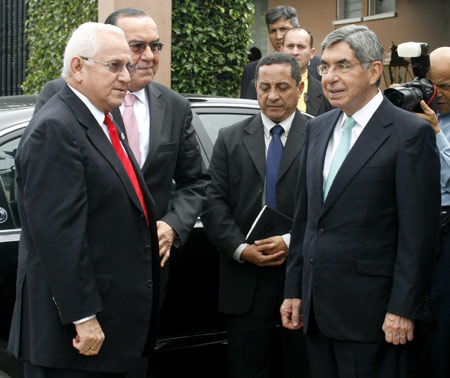Ousted Honduran President Manuel Zelaya and post-coup leader Roberto Micheletti met Thursday with Costa Rican President Oscar Arias respectively in San Jose, but Micheletti swiftly left the country, squashing all hopes of a face-to-face meeting.
 |
|
Honduran post-coup leader Roberto Micheletti (L front) is greeted by Costa Rican President Oscar Arias (R front) in front of the latter's residence in San Jose, capital of Costa Rica, July 9, 2009. Honduras' ousted President Manuel Zelaya and Roberto Micheletti are due to make a mediation dialogue hosted by Oscar Arias here on Thursday to try to thrash out a solution to the political crisis triggered by last month's coup in the Central American state. [Xinhua] |
Arias, a 1987 Nobel Peace Prize winner, was accepted by both parties to serve as a mediator in the talks.
The gathering was scheduled for two days. But it ended with the naming of four commissioners on each side to continue the talks shortly after Micheletti left Arias' home. Noticeably, Zelaya and Micheletti were not able to bring themselves to speak to one another.
Speaking to the press when ending his meeting with Arias, Zelaya demanded "the reestablishment of law, democracy and the return of Honduras' elected president."
Micheletti told reporters, as he left Arias' home, that he was "satisfied" with the talks, but did not go into details. He left directly for the airport.
Zelaya, who was seized in his bed by heavily armed troops and forced to leave the country by plane, has received the backing of the United Nations, the Central American Integration System and a host of international bodies.
Micheletti, who took power after claiming to the Honduran legislature that Zelaya had resigned due to poor health, has failed to receive any international recognition from other countries or multilateral organizations.
Micheletti's presence in Costa Rica sparked protests from students there, who went to the streets close to Arias' home, a one-story suburban dwelling with few security guards.
"There is nothing to negotiate," said the University of Costa Rica's student union head. "The only appropriate thing is to restore Zelaya."
In Honduras, Zelaya's wife, Xiomara Castro, led a series of rallies, which have attracted thousands of people and blocked streets and highways.
Castro, who had fled to the U.S. embassy when soldiers kidnapped her husband and has been hiding from one place to another since then, told media: "Our presence is like having the president here, like he is standing firm."
There have been reports of four deaths as police broke up separate protests against the change of leadership. Micheletti's supporters have also protested, but without any official intervention.
One external player -- the United States -- looms large at the talks. U.S. Secretary of State Hilary Clinton warned Zelaya not to try to return home without an agreement.
The United States has a long history of friendship and support with Honduras' military, but it too has condemned the coup and cut off a military aid of 16.5 million U.S. dollars this week.
 |
|
Honduras' ousted President Manuel Zelaya (L) talks with Costa Rican President Oscar Arias in front of Oscar Arias's residence in San Jose, capital of Costa Rica, July 9, 2009. Manuel Zelaya and Honduran post-coup leader Roberto Micheletti are due to make mediation dialogue hosted by Oscar Arias here on Thursday to try to thrash out a solution to the political crisis triggered by last month's coup in the Central American state. [Xinhua] |
A planned non-binding referendum, opposed by Honduras' army and courts, was the apple of discord that caused the military intervention. Zelaya had wanted to ask citizens if they would like to vote for a constitutional assembly in November alongside presidential elections. In doing so, he had publicly defied the Supreme Court, who argued that the constitution had some clauses that could not be rewritten.
Micheletti has shown no interest in that idea, describing himself as the nation's constitutional president on multiple occasions, even as the Central American Integration System, of which Arias holds the rotating presidency, has cut off access to disbursements or new loans from its Central American Bank for Economic Integration.
Arias, a regional icon after helping bring several wars to an end in the 1980s, remained positive.
"It seems to me that there is willingness on both sides to seek a negotiated settlement through diplomacy, through dialogue," Arias told media early on Thursday.
However, Jose Miguel Insulza, the Chilean secretary general of the Organization of American States, raised the specter of worse consequences if the talks founder.
"If the Honduran crisis is not resolved, it could leave the door open for other coups in Latin America," said Insulza in Washington.
(Xinhua News Agency July 10, 2009)